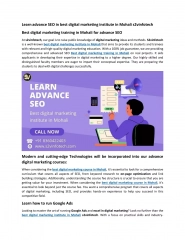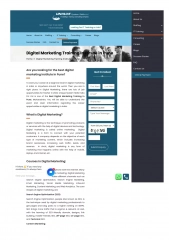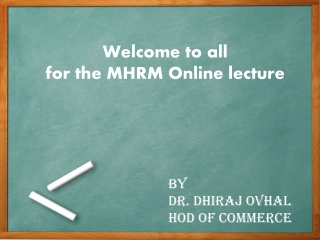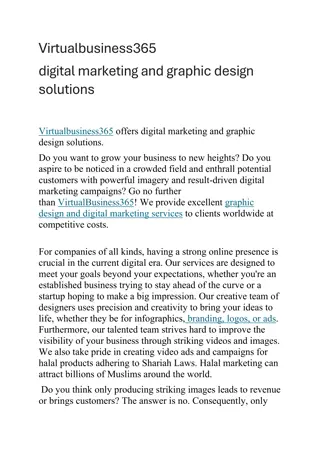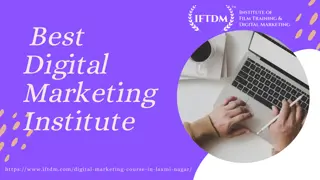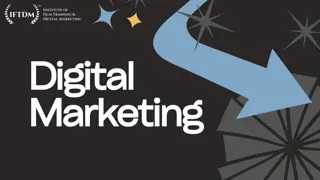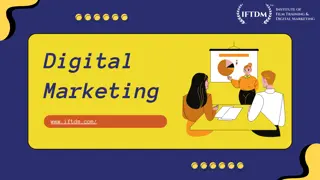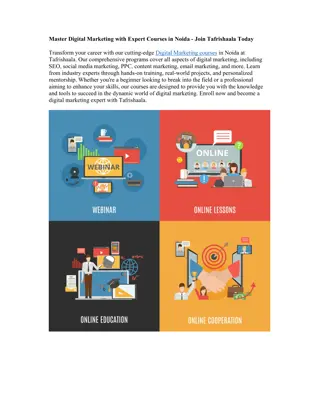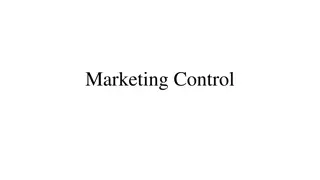
Reasons to Study Marketing and Key Concepts Explained
Discover why studying marketing is crucial in today's digital world and learn about key marketing frameworks, theories, and tools. Explore the definition of marketing, products and services, and the importance of understanding customer needs and behaviors.
Download Presentation

Please find below an Image/Link to download the presentation.
The content on the website is provided AS IS for your information and personal use only. It may not be sold, licensed, or shared on other websites without obtaining consent from the author. If you encounter any issues during the download, it is possible that the publisher has removed the file from their server.
You are allowed to download the files provided on this website for personal or commercial use, subject to the condition that they are used lawfully. All files are the property of their respective owners.
The content on the website is provided AS IS for your information and personal use only. It may not be sold, licensed, or shared on other websites without obtaining consent from the author.
E N D
Presentation Transcript
Marketing I Aviation & Mechatronics Engineering Departments
There are many reasons why should study Marketing, and below are some of the reasons:- Enhance employment opportunities Marketing skills are essential in our fast-growing digital world. Social Media Search Engine Optimization Studying Marketing helps you understand how to influence people s decisions Through Marketing Research, you will learn more about Competitors You will learn to understand other perspectives
Learning outcomes of this subject Apply key marketing frameworks, theories, and tools to solve Marketing problems. Utilize information of an organization s internal and external marketing environment to critically identify and priorities appropriate marketing strategies. Critically evaluate the key analytical frameworks and tools used in marketing
What is Marketing The anticipating requirements Marketing 2015). Marketing is the activity, set of institution, and processes to create, exchange communicate,, and deliver product and services that have values for clients, customers, society and partners (Marsall g and Johnsto M 2023). Marketing consists of many activities including: identifying customer needs; developing goods and services to satisfy those needs; communicating information about products to potential customers; and management, which assures that products are delivered to customers as needed (University of North Texas 2023). management process and responsible satisfying (The for identifying, customer Institute profitably. Chartered of logistics and distribution
Products and Services Each business or firm is offering some kind of products or services to their customers, but what exactly are products and services? Firm, Company, Business: is an organization which sells or produces product or provides a service which customers pay for Customer: is an individual or company that purchases goods or services Product is anything that can be offered in a market for attention, acquisition, use, or consumption that might satisfy a need or want (Kolter, P and Armstrong, G 2017)
Service is a product that consists of activities, benefits or satisfaction that is essentially intangible and does not result in the ownership of anything (Kolter, P and Armstrong, G 2018). Services are like Medical care Educational Services
Marketing Involves Understanding Customer needs. Translating those needs into products and services. Packing and pricing products and services Convince customers to buy those products and services.
Marketing Goals According to Kolter, P and Armstrong, G 2017, organizational goals depends on determining and knowing the needs and wants of target markets and delivering the desired satisfactions better than competitors do .
Goals are like Increase revenue Offer them promotions, ads, and discounts Connect with your leads like calls, email, chats, social media, etc.
Increase brand awareness Posting regularly Updating all online pages with the latest information Increase customer value Provide quality customer service Give them privilege access to new products or services
Marketing Objectives Marketing objectives are a set of clearly defined, measurable goals established as part of a marketing plan. Marketing objectives often follow the SMART methodology:
The SMART acronym was first used in 1981 in an edition of Management Review, attributed to George Doran (Charted Institute of Marketing 2020). Specific A set quantity result. Followers, revenue, signups etc Measurable You have the tools necessary to measure it Attainable The market and business performance support it
Relevant The business benefits and you can do it Time-based Also called 'timely' or 'time-bound'. Has a set time to end or time limit.
References Kotler, P., Armstrong, G. and Opresnik, M.O. (2018) Principles of Marketing. Singapore: Pearson Education South Asia Pte Ltd. Kotler, P. et al. (2017) Principles of Marketing. Harlow, England: Pearson. Marshall, G.W. and Johnston, M.W. (2023) Marketing management. New York, NY: McGraw-Hill Education. Srw0098 (2021a) What is marketing?, G. Brint Ryan College of Business. Available at: https://cob.unt.edu/mktg/what-is-marketing (Accessed: 08 October 2023). Team CIM, C. (2023) How to set smart objectives: CIM content hub, How to set SMART objectives | CIM Content hub. Available at: https://www.cim.co.uk/content-hub/editorial/back-to-basics-how-to-set- smart-objectives/ (Accessed: 08 October 2023).
Thank You For Your Attention




